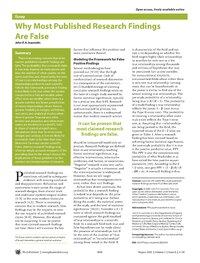
Photo from wikipedia
In principle, successful replications should enhance the credibility of scientific findings, and failed replications should reduce credibility. Yet it is unknown how replication typically affects the influence of research. We… Click to show full abstract
In principle, successful replications should enhance the credibility of scientific findings, and failed replications should reduce credibility. Yet it is unknown how replication typically affects the influence of research. We analyzed the citation history of 98 articles. Each was published by a selective psychology journal in 2008 and subjected to a replication attempt published in 2015. Relative to successful replications, failed replications reduced citations of replicated studies by only 5% to 9% on average, an amount that did not differ significantly from zero. Less than 3% of articles citing the original studies cited the replication attempt. It does not appear that replication failure much reduced the influence of nonreplicated findings in psychology. To increase the influence of replications, we recommend (a) requiring authors to cite replication studies alongside the individual findings and (b) enhancing reference databases and search engines to give higher priority to replication studies.
Journal Title: Perspectives on Psychological Science
Year Published: 2022
Link to full text (if available)
Share on Social Media: Sign Up to like & get
recommendations!